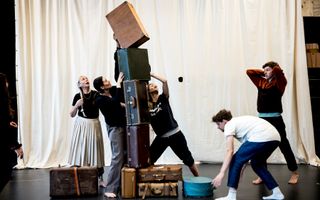 On Stage
On Stage
ANTIPHOLUS OF SYRACUSE
I to the world am like a drop of water
That in the ocean seeks another drop...
Act 1, Scene 2
Antipholus of Syracuse is the long-lost twin brother of Antipholus of Ephesus. After being separated from his twin brother at birth, Antipholus of Syracuse sets sail at the age of 18 in search of his lost sibling. He is Egeon’s son, a cautious traveller, wary of the possibility of magic and the supernatural and suspicious of the inhabitants of Ephesus, fearing they are all sorcerers. Antipholus is attended by his servant, Dromio of Syracuse, who he appears to be fond of, though physically beats often. His disorientation escalates as he tries to understand the strange behaviour of the Ephesians. He wonders whether their accommodating nature and the gifts they bestow upon him to be trusted, or whether he is correct in suspecting that supernatural powers are at work. He does not appear as worldly or confident as his twin brother.
ANTIPHOLUS OF EPHESUS
Consent to pay thee that I never had!
Arrest me, foolish fellow, if thou dares.
Act 4, Scene 1
Antipholus of Ephesus is the long-lost twin brother of Antipholus of Syracuse, and husband of Adriana. Antipholus of Ephesus is a respected merchant. Never knowing his father and brought to Ephesus by the former Duke Menaphon, Antipholus of Ephesus was initially raised in Corinth. Antipholus is married to Adriana and is the head of a large and bustling household. He is a favourite of the current Duke Solinus, and in contrast to his travelling twin he comes across as a much more settled, confident and established citizen. In the confusion and chaos of mistaken identities he has much to lose, given his reputation is one of honour and respect. He is also followed and waited upon by a Dromio (this one of Ephesus) and has a tendency towards bad-tempered behaviour, often beating upon Dromio and his servants in moments of rage.
DROMIO OF SYRACUSE
Was there ever any man thus beaten out of season,
When in the why and the wherefore is neither rhyme
nor reason?
Act 2, Scene 2
Dromio of Syracuse is Antipholus of Syracuse’s servant, and long-lost twin brother of Dromio of Ephesus. Known as a quick-witted fellow, he maintains a good relationship with his master, yet is often phsycially beaten by him. Despite this, we can see they have a clear bond expressed in moments of shared wit and impressive verbal repartee. Throughout the story Dromio maintains a good-hearted nature, despite regular mistreatment at the hands of his master. As with his master, he also seems less worldly and confident than his twin.
DROMIO OF EPHESUS
Go back again, and be new beaten home?
For God's sake, send some other messenger.
Act 2, Scene 1
Dromio of Ephesus is Antipholus of Ephesus’ servant, and long-lost twin brother of Dromio of Syracuse. Adriana, the wife of Dromio’s master, Antipholus, dishes out regular beatings, which he endures, making fearless escapes from time to time if the abuse gets too much. Although patient, Dromio is confused by the meaning behind the harsh treatment he receives and spends a lot of his time flummoxed by the many misunderstandings of the story in which he plays a part. Dromio has a love interest in the kitchen-maid, Nell, at the home of Antipholus.
EGEON
O, grief hath changed me since you saw me last...
Act 5, Scene 1
Egeon is a merchant from Syracuse and the father of the Antipholus twins. The play opens with Egeon telling the Duke the story of his life in which he has endured many challenges and grief. It is even noted that his grief has altered his appearance, so much so that his own son does not initially recognise him.
Egeon has led a challenging life, having lost both his wife and one of his sons, Antipholus of Ephesus, in a storm and subsequent shipwreck. When he sneaks into Ephesus to seek out his son, Egeon is recognised as a Syracusan and sentenced to death for crossing the border. He pleads with Duke Solinus, who allows him to roam the town in order to find someone to pay a suitable ransom by sundown in order to spare his life. Egeon’s tales of woe touch Duke Solinus, yet cannot change the law against him. At the conclusion of the play, just as Egeon prepares to lose his life, he is reunited with his sons, the Dromio twins, and even his long lost wife, Emelia, who is now the Abbess of Ephesus. Egeon is at the heart of the play’s representation of grief, loss and family. As the old man of Syracuse, he bookends the story, giving a sense of passing time.
ADRIANA
I see two husbands, or mine eyes deceive me.
Act 5, Scene 1
Adriana is the wife of Antipholus of Ephesus and sister of Luciana. She is presented in the play as a kind of proto-feminist, angered that her husband is paying attention to another woman as well as being generally frustrated by the inequality of gender politics in Ephesus. She bemoans that men are never as committed to relationships as woman and ultimately enjoy more social freedom. Adriana feels wronged by her husband’s desertions, but maintains that his interactions with the Courtesan are honest and respectable. She has a different perspective on gender roles than her sister, Luciana, and sees her sister as ill-informed, subservient and passive. Adriana is of wealthy birth and married her husband only at the Duke’s entreaty. She is quick-tempered, somewhat tempestuous and beats her servants when they step out of line.
LUCIANA
And may it be that you have quite forgot
A husband's office?
Act 3, Scene 2
Luciana is the sister of Adriana and love interest of Antipholus of Syracuse. In direct contrast to the beliefs of her sister, Adriana, Luciana tends to preach about the necessary subservience and patience women should offer the respective men in their lives. Luciana views marriage in a more traditional sense than her sister, who believes women should have more power and agency. She lives in Ephesus with both Adriana and Antipholus. Regardless of her seeming comfort and acceptance of what she considers a woman’s place in society, she doesn’t hesitate in confronting her brother-in-law or speaking harshly towards the servants.
EMELIA
Whoever bound him, I will loose his bonds
And gain a husband by his liberty.
Act 5, Scene 1
Emelia is the highly respected Abbess of Ephesus, and the long-lost wife of Egeon and mother of the Antipholus twins. Years ago she was shipwrecked and lost her husband as well as her twin sons. She offers yet another perspective on a woman’s role in the play by commenting that wives should chide their husbands for spending time with other women, but expresses distaste for women who complain too much within their marriages.
DUKE SOLINUS
I'll limit thee this day
To seek thy life by beneficial help:
Try all the friends thou hast in Ephesus...
Act 1, Scene 1
As the ruler of Ephesus, Duke Solinus shows great commitment to the rules of the town, insisting that even if he wished to, he could never ignore or change the law. He rigidly upholds the immigration law, requiring that every Syracusan found within the boundaries of Ephesus pay a thousand marks if they are to legally travel as a merchant. He is a patron to Antipholus of Syracuse and the force behind his marriage to the rich and respected Adriana. He shows compassion and pity and acknowledges the strangeness of events unfolding in his town, linking them intelligently to Egeon’s story of woe and struggle.
ANGELO
This touches me in reputation.
Either consent to pay this sum for me
Or I attach you by this officer.
Act 4, Scene 1
Angelo is a goldsmith of Syracuse who is commissioned by his friend, Antipholus of Ephesus, to create a fine gold chain. He is highly protective of his reputation and standing in the town of Ephesus. Angelo is a man of his word, and is therefore greatly confused by his friend’s actions when the agreed plans they made are not respected. While Angelo is a minor character, he is integral to the plot of the play because the gold chain is a source of great confusion between the two sets of twins and Angelo, who involves the police in the matter leading to Antipholus of Ephesus’ arrest.
DR PINCH
Mistress, both man and master is possess'd...
Act 4, Scene 4
A schoolmaster, conjurer and exorcist, Dr Pinch is employed by Adriana to cure the suspected ‘madness’ of Antipholus of Ephesus. In this way, Dr Pinch offers much towards the supernatural themes of the play. He is described as being extremely lean, bearded, with deep-set eyes and a yellow cast to his face. Diagnosing both Antipholus and Dromio with supernatural possession, Dr Pinch states that the right cure is to have both of them tied up and left in a dark room. Antipholus and Dromio escape their imprisonment and torture Dr Pinch, setting his beard on fire then putting the flames out with filthy water.
COURTESAN
I pray you, sir, my ring, or else the chain:
I hope you do not mean to cheat me so.
Act 4, Scene 3
The Courtesan is a client of Antipholus of Ephesus, much to the annoyance of his wife, Adriana. The two appear to have a close relationship, and he dines with her when Adriana refuses to let him inside for dinner. The Courtesan believes Antipholus must be ‘mad’ when he turns on her, claiming that she is a product of the devil (not knowing she is speaking to Antipholus of Syracuse). The Courtesan stands her ground in the story and ends up joining with Adriana in bringing Antipholus to justice.
BALTHASAR
I hold your dainties cheap, sir, and your
Welcome dear.
Act 3, Scene 1
Balthasar is a merchant of Ephesus and a friend of Antipholus of Ephesus.







